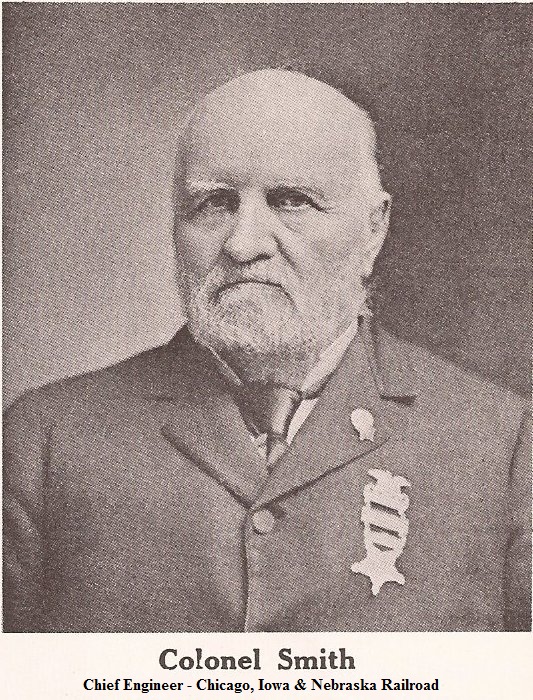Diary from Clinton's Early Days - 1855
From: The Clinton Daily Herald; July 30, 1902
Transcribed by a Clinton County IaGenWeb volunteer.
FROM AN OLD DIARY
THE NATAL DAY PROPER OF THE CITY OF CLINTON.
Joseph Nimmo, the Statistician, Writes The Herald an Interesting Letter
Regarding the Inauguration of the City – August 1, 1855 the Birthday of the
Town.
Joseph Nimmo, Jr., the statistician and economist of Washington, D. C., sends
The Herald the following communication which will be read with deep interest by
the people of the city:
The Natal Day of Clinton.
Referring to my diary for the year 1855, I find that August 1st of that year may
be regarded as the natal day of the city of Clinton, as on that day the town was
formally inaugurated. I was then employed as a civil engineer by the Mississippi
& Iowa Central Railroad company. Our company being unable to procure sufficient
land for depot purposes at Lyons, about July 15th some of our principal
officers, as a land company, purchases of two brothers by the name of Pierce the
land on which the city of Clinton is located. On Monday, July 23rd, 1855, I took
my engineering party down from Lyons to the then unnamed town and at about 9
o’clock that morning the first stake for the survey of the city was driven under
my direction by General William C. Brown, of Syracuse, N. Y., secretary of our
railroad company and then major general of the western division of the troops of
the state of New York.
During the week that intervened before the grand celebration of August 1st a
shanty nearly 100 feet long was hastily erected, a steamboat, “The Audubon,” was
chartered to bring visitors up the river. White’s Band of Davenport was hired,
and invitations were sent out 80 miles north, south and west, even to points
beyond the “Wapsie.” The day dawned with a heavy downpour of rain, which
continued during the morning, but just before noon the clouds broke and the sun
shone out from a clear sky. The American flag, and a great streamer with the
name “Clinton” were hauled up on our flagstaff, which had been planted near the
river front. The town then consisted of two small frame buildings, a log house,
the newly erected shanty, and the 20 foot square tent of the engineer corps. At
about 3 p. m. the “Audubon” hove in sight with its load of visitors from
Burlington, Muscatine and Davenport. Our entire company was at the river bank.
We received them with cheers, answered back by the people on the boat, the band
playing lively airs. Judge Williams, attorney for our railroad company, then
announced that the company on the boat would please remain on board and that as
many of our people who desired would come aboard, and that the boat would
proceed to Fulton and Lyons in order to bring down visitors to the celebration.
That was done. As we drew out from Lyons the company of board gave three rousing
cheers for Clinton and the band struck up the tune “Jordan’s a Hard Road to
Travel,” which latter had a satirical significance the meaning of which it is
unnecessary to explain to you. On returning to Clinton at about 4 p. m., all
assembled in a grove in front of the town, where speeches were made by Judge
Williams of Muscatine, General Charles B. Stewart, consulting engineer of our
company, who laid out the town of Clinton, and other distinguished men, but I
failed to mention their names in my diary, being more interested in noting the
young ladies who were present, my impressions of their appearance and the
pleasure I had in their company.
At the same time the cornerstone of a Presbyterian church was laid. As soon as
the speaking was ended all adjourned to the great shanty where an abundant feast
had been prepared for the entire company. The engineer corps and all the other
available young men served as waiters and enjoyed the service. Then the tables
were hastily cleared away and dancing began. At twelve o’clock it was announced
that the boat would leave with the visitors from Lyons and Fulton. We young men
accompanied our lady friends to those points. It was a beautiful moonlit night,
and all went merry with as them. On returning to Clinton at about 1 a. m., we
went ashore our friends from below went aboard, and with band playing, whistle
blowing and hearty cheers from boat and shore we ended the festivities, which
marked the formal inauguration of the city of Clinton.
 The Mississippi & Iowa Central railroad was reorganized as the Chicago, Iowa &
Nebraska railroad in January, 1856, and Col. Milo Smith of Clinton became our
chief engineer.
The Mississippi & Iowa Central railroad was reorganized as the Chicago, Iowa &
Nebraska railroad in January, 1856, and Col. Milo Smith of Clinton became our
chief engineer.
What changes, what progress has marked the years which have succeeded that
memorable August 1, 1855. It has been the most eventful period of the world’s
history. When I landed at Lyons on April 28th, 1855, there was not a bar of
railroad track laid in the state of Iowa. Now you have about 9,500 miles of
railroad in your state. At that time the best informed railroad builders of this
country declared that a railroad across the continent was utterly impracticable,
but today the American continent presents no barrier to the flow of commerce.
Each one of the six trans-continental railroads, as well as all the other great
trunk lines of the country are for the general purposes of commerce greatly
superior even to the ocean, nature’s free highway.
Across the gulf of time which has intervened since 1855, I send a friendly
greeting and the story of pleasant memories to the people of the city of
Clinton, Iowa.
JOSEPH NIMMO, JR.

